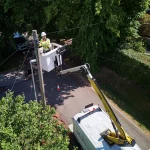Royal Mail Says Superfast Broadband to Boost UK Online Sales to GBP740m
A new Royal Mail commissioned study of 1,412 adults in Britain with access to “superfast broadband“, and 1,710 adults with no superfast service, has discovered that having faster connectivity boosts online sales and this equates to an increase in spending of 3.1% (around £23 a year) per superfast broadband user.
The analysis, which was conducted by the Centre for Economics and Business Research, predicted that an additional £515 million could be added to online sales annually once the roll-out reaches the target of between 90% and 95% of the population by 2017 (apparently increasing total online shopping to £740 million each year once completed).
Advertisement
The £515 million figure is based on the assumption that 95% of adults have access to superfast broadband once the roll-out is complete and that superfast penetration is equal to current broadband penetration, with additional adopters of ‘superfast’ experiencing a similar proportional uplift in their online spending habits to those that have already adopted the technology.
But the impact upon online sales was also found to vary “significantly” across Britain. For example, Internet shoppers in Scotland and Wales have increased their spending the most since receiving superfast broadband (5.1% and 4.4% respectively). However the South West of England experienced the lowest average increase at 1.4%. View a Chart of Regional Differences.
Apparently this difference largely coincides with lower population densities in some parts of Britain (i.e. if you have to travel longer distances to reach the shops then online shopping becomes more attractive) and a higher average age in the South West (i.e. older people are less likely to shop online).
Nick Landon, MD of Royal Mail Parcels, said:
“Royal Mail’s study shows that the investment in superfast broadband networks is having a positive impact on spending online. Superfast broadband is acting as a catalyst, encouraging people to spend more online and the further roll-out of networks across Britain over the coming years can only benefit the online retailing market.”
The study also found that shoppers in Edinburgh are estimated to have increased their online spending by £4.4 million since getting superfast broadband, the highest rise of any local area in Britain. The Scottish capital beat Birmingham into second place and Glasgow into third, with Cardiff and Croydon following in fourth and fifth.
Advertisement
However it should be said that people in areas with reasonable broadband connectivity, even if it’s not superfast (24Mbps+), should not strictly be disadvantaged in the online shopping sector because most websites do not require a superfast connection in order to function at their best.
Granted loading up Amazon.co.uk might be a fraction of a second or two slower on a 1-2Mbps service than 24Mbps+, but that’s hardly a difference of any real significance. Websites generally aren’t bandwidth hogs unless you’re streaming video or conducting big software downloads etc. But superfast connectivity might encourage people to do more things online (e.g. streaming TV channels) and that in turn may indirectly help to boost online shopping.
Mark is a professional technology writer, IT consultant and computer engineer from Dorset (England), he also founded ISPreview in 1999 and enjoys analysing the latest telecoms and broadband developments. Find me on X (Twitter), Mastodon, Facebook, BlueSky, Threads.net and Linkedin.
« UPDATE2 Origin Broadband – Anger Over Notice of Digital Region Closure
JT Celebrates 10,000th Jersey Fibre Optic Broadband Customer »
















































Comments are closed